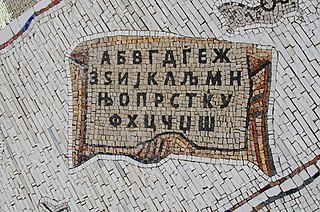
Serbo-Croatian – also called Serbo-Croat, Serbo-Croat-Bosnian (SCB), Bosnian-Croatian-Serbian (BCS), and Bosnian-Croatian-Montenegrin-Serbian (BCMS) – is a South Slavic language and the primary language of Serbia, Croatia, Bosnia and Herzegovina, and Montenegro. It is a pluricentric language with four mutually intelligible standard varieties, namely Serbian, Croatian, Bosnian, and Montenegrin.
Slavic or Slavonicstudies, also known as Slavistics, is the academic field of area studies concerned with Slavic peoples, languages, literature, history, and culture. Originally, a Slavist or Slavicist was primarily a linguist or philologist researching Slavistics. Increasingly, historians, social scientists, and other humanists who study Slavic cultures and societies have been included in this rubric.

The South Slavic languages are one of three branches of the Slavic languages. There are approximately 30 million speakers, mainly in the Balkans. These are separated geographically from speakers of the other two Slavic branches by a belt of German, Hungarian and Romanian speakers.

The Balkan sprachbund or Balkan language area is an ensemble of areal features—similarities in grammar, syntax, vocabulary and phonology—among the languages of the Balkans. Several features are found across these languages though not all apply to every single language. The Balkan sprachbund is a prominent example of the sprachbund concept.
Radoslav Katičić was a Croatian linguist, classical philologist, Indo-Europeanist, Slavist and Indologist, one of the most prominent Croatian scholars in the humanities.

Shtokavian or Štokavian is the prestige supradialect of the pluricentric Serbo-Croatian language and the basis of its Serbian, Croatian, Bosnian and Montenegrin standards. It is a part of the South Slavic dialect continuum. Its name comes from the form for the interrogative pronoun for "what" što. This is in contrast to Kajkavian and Chakavian.
Vjekoslav Perica is a Croatian historian, journalist and writer who specializes in the modern history of religions in the former Yugoslavia.

Torlakian, or Torlak, is a group of transitional South Slavic dialects of southeastern Serbia, Kosovo, northeastern North Macedonia, and northwestern Bulgaria. Torlakian, together with Bulgarian and Macedonian, falls into the Balkan Slavic linguistic area, which is part of the broader Balkan sprachbund. According to UNESCO's list of endangered languages, Torlakian is vulnerable.
Dalibor Brozović was a Croatian linguist, Slavist, dialectologist and politician. He studied the history of standard languages in the Slavic region, especially Croatian. He was an active Esperantist since 1946, and wrote Esperanto poetry as well as translated works into the language.

Milovan Danojlić was a Serbian poet, essayist and literary critic best known for his children's poetry. Danojlić was a full member of the Serbian Academy of Science and Arts.
Christina Elizabeth Kramer is Professor of Slavic and Balkan languages and linguistics at the University of Toronto and Chair of the university's Department of Slavic Languages and Literatures which is part of the Faculty of Arts and Science.

Eppes Wayles Browne III is a linguist, Slavist, translator and editor of Slavic journals in several countries. Browne is a professor emeritus of linguistics at Cornell University, with research interests in Slavic and general linguistics, notably the study and analysis of Serbo-Croatian, where he is one of the leading Western scholars.

Macedonian studies is an academic discipline within Slavic studies that focuses on the comprehensive study of the Macedonian language, literature, history, and culture. As part of Slavic studies, it falls within the subgroup of South Slavic languages and cultures. Apart from North Macedonia, Macedonian Studies is also taught at universities worldwide, including in Albania, Canada, Poland, the United States, and post-Yugoslav countries. A linguist who studies Macedonian as part of the field is called a Macedonist.

Croatian is the standardised variety of the Serbo-Croatian pluricentric language mainly used by Croats. It is the national official language and literary standard of Croatia, one of the official languages of Bosnia and Herzegovina, Montenegro, the Serbian province of Vojvodina, the European Union and a recognized minority language elsewhere in Serbia and other neighbouring countries.
Serbo-Croatian is a South Slavic language that, like most other Slavic languages, has an extensive system of inflection. This article describes exclusively the grammar of the Shtokavian dialect, which is a part of the South Slavic dialect continuum and the basis for the Bosnian, Croatian, Montenegrin, and Serbian standard variants of Serbo-Croatian. "An examination of all the major 'levels' of language shows that BCS is clearly a single language with a single grammatical system."

The dialects of Serbo-Croatian include the vernacular forms and standardized sub-dialect forms of Serbo-Croatian as a whole or as part of its standard varieties: Bosnian, Croatian, Montenegrin, and Serbian. They are part of the dialect continuum of South Slavic languages that joins through the transitional Torlakian dialects the Macedonian dialects to the south, Bulgarian dialects to the southeast and Slovene dialects to the northwest.

Ranko Bugarski is a Serbian linguist, academic and author.

Branko Tošović is an Austrian and Serbian philologist, linguist and literary scholar.
Biljana Šljivić-Šimšić was a professor emeritus at the University of Illinois and an author of several scholastic books, including a Serbian-English dictionary.
Charles Edward Townsend was an American Slavicist and linguist who served as chair of the Department of Slavic Languages and Literatures at Princeton University from 1970 until his 2002 retirement and who authored several well-regarded works on the Russian and Czech languages as well as on Slavic linguistics.










